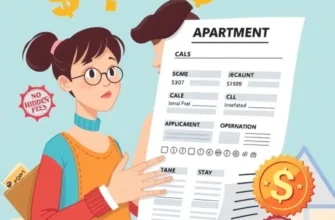Renting a home is like dating—deceptively simple yet fraught with complexities. As a young adult, first-time renter, or even a couple trying to find that perfect cozy spot, negotiating rent might seem daunting. It’s more than just haggling over numbers; it’s about building a relationship with your landlord and finding common ground that benefits you both. Whether you’re navigating a high-stakes rental market or trying to escape the clutches of roommate chaos, knowing how to negotiate can save your wallet and sanity. And let’s be real, you’ll want to brag about that rent reduction to your friends later, right? So buckle up and prepare for an enlightening journey into the world of rent negotiation where we’ll cover everything from research tactics to charming your way through tough conversations. The keys to your new front door—and a better bank balance—await you!
The Preparation: Do Your Homework

Stepping into the world of renting can be an exciting adventure, but it requires strategic preparation. Before negotiating rent, it’s crucial to arm yourself with comprehensive knowledge about the local market. Begin this journey by researching similar properties in your desired area. This should give you a clear understanding of the prevailing rental price range.
Start by listing properties similar in size, location, and condition to the unit you’re eyeing. Online real estate platforms are valuable resources when gathering this information. They often provide detailed insights into rental prices, property conditions, and lease terms. Visiting open houses can also give you a tangible feel of what’s on offer and at what cost.
When you analyze these properties, take note of the amenities they offer. Does the rental include luxurious additions such as a gym, a pool, or in-unit laundry? Evaluate what your prospective home offers in contrast. If it lacks certain amenities prevalent in other listings, that omission can strengthen your negotiation position.
Understanding the local market goes beyond rental prices and amenities. It involves examining occupancy rates and rental trends. High vacancy rates in the area can be a strong indicator that you have room to negotiate a better deal. A slow movement in the rental market might also mean landlords are more likely to agree to reduced rates just to fill their units. Consult local market reports or contact real estate agents who specialize in the area to get up-to-date statistical data. This effort will bolster your arguments during negotiations.
Positive reviews play a vital role too. Look into reviews of the property management or landlord from current or past tenants. If reviews highlight fairness, responsiveness, and professionalism, you can leverage this information in conversation. Quote positive sentiments to reassure the landlord of your reliability and to set a cooperative tone for negotiations.
When you finally present your case, be prepared. Bring evidence of comparable listings that justify your desired rent, and cite any noticeable disparities in amenities. Mention high vacancy rates or any rental downturns. This methodical preparation not only establishes your request as reasonable but also presents you as a savvy tenant worth considering.
Such thorough groundwork ensures you walk into the negotiation with confidence and the facts at your fingertips. Incorporating knowledge from neighboring areas might help too; for instance, exploring rental insights in similar cities could provide additional perspective (here is some guidance on rental trends in Philadelphia). Equipping yourself with these insights creates a compelling argument for a fair and reasonable rent, and positions you as a formidable negotiator primed for successful discussions.
The Art of the Ask: Mastering the Conversation

You’ve done your homework, and now it’s showtime. When approaching your landlord or property manager, maintain a balance of strategy and charm. Start with a sincere compliment; perhaps acknowledge how well the property is maintained or mention how much you’ve enjoyed living there. This sets a positive tone and opens the door to a more receptive audience.
Transitioning into your request requires finesse. You’ve armed yourself with market data, so use it wisely. For instance, mentioning, “I’ve noticed similar properties in the area are priced lower,” provides a factual basis for your negotiation. Tailor your remarks to suggest that your request aligns with broader trends: “Given that the market is shifting, I’m hoping we can discuss the rent.”
Humor is a powerful tool in negotiations. A light-hearted comment can ease the tension and transform the interaction into a more amicable conversation. Consider a gentle, “I promise I won’t ask for a raise in my allowance,” as you start discussing financial adjustments. It conveys confidence and a relaxed attitude, highlighting your approachability.
Emphasize your strengths as a tenant. Mentioning a stellar credit score and providing glowing references can significantly boost your negotiating position. These details assure the landlord or manager of your reliability, making their consideration of your request more favorable. If you’re still working on your credit, check out these credit score renting tips for further guidance.
Structuring the conversation this way combines the practicality of statistics and the warmth of personal interaction. The goal is to strengthen your credibility with a blend of data and personal assurance. By staying positive and respectful, you’re more likely to transform your request into a mutually satisfying agreement.
Remember, each negotiation is unique, and the goal is not just to lower rent but to establish a solid rapport with your landlord. Every interaction is an opportunity to foster trust and ensure a healthy, ongoing relationship. With these strategies, you’re not only negotiating rent, but you’re also mastering a crucial life skill that will serve you in many future endeavors.
Final words
Negotiating rent doesn’t have to be as nerve-wracking as a final exam. With the right preparation and conversation strategies, you can turn what feels like an uphill battle into a straightforward discussion. Remember, landlords appreciate informed tenants, and a bit of charm can help ease any tension. Whether you’re a first-time renter or looking for a new family home, your negotiation skills can significantly impact your budget. The key takeaway? Knowledge is power; don’t shy away from speaking up! Now, armed with these tactics, go forth and conquer your rental dreams. Your future self will thank you for it!









